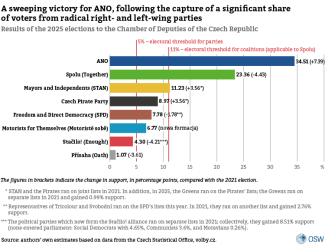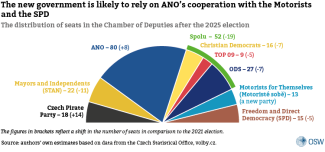Parliamentary elections in the Czech Republic: Babiš’s triumph
The opposition ANO movement, led by oligarch Andrej Babiš, achieved the best result in the parliamentary elections held on 3–4 October, winning 34.5% of the vote and securing 80 seats in the 200-member Chamber of Deputies. With voter turnout reaching its highest level since 1998 – just under 69% (up 3.5 percentage points compared with 2021) – the party increased its share of support by 7.4 percentage points compared with four years ago, gaining eight additional seats. It won in all regions except the capital, as well as in all cities with populations over 30,000, with the exception of the two largest – Prague and Brno. The core of the governing coalition, the centre-right Spolu alliance led by Prime Minister Petr Fiala, received 23.4% of the vote (a fall of 4.4 percentage points) and will hold 52 seats – a loss of 19. The Prime Minister admitted defeat, stating that his camp must prepare for ‘intensive work in opposition’.
On the evening the results were announced, initial talks began on possible government cooperation between ANO and representatives of the far-right Freedom and Direct Democracy (SPD), which secured 15 seats, as well as the Eurosceptic Motorists for Themselves party (Motoristé sobě; 13 seats). President Petr Pavel took part in discussions with the leaders of parties that will enter the Chamber of Deputies and announced that the first session of the new parliament should be convened at the beginning of November. During his meeting with the head of state, Babiš reportedly presented a set of proposals to resolve his conflict of interest as both a politician and the head of the Agrofert conglomerate, which operates in close association with the state (public procurement, subsidies).
The most likely post-election scenario is that ANO will play a key role in the new government and form a coalition with the Motorists. Support from SPD deputies – in exchange for concessions – will secure a parliamentary majority for the new government.
Commentary
- The clear winners are Babiš and his ANO movement, which successfully mobilised its potential electorate. In absolute terms, it achieved the best result in the history of these elections, and in terms of seat count and percentage share, it recorded the second-best outcome after ODS in 2006. The highest increases in turnout compared with the previous elections (5–7 percentage points) were recorded in districts around Ostrava and in the western and north-western parts of the country – areas once considered traditional left-wing strongholds, but which over the past decade have shifted towards ANO. In the final stage of the campaign, Babiš managed to sway undecided voters from both SPD and the Stačilo! (Enough!) coalition centred around the communists. Two final televised debates, which drew high viewership and featured only Babiš and Prime Minister Fiala, played a key role in this shift. The format implied that other electoral contenders were of lesser relevance. The Spolu alliance also benefited from this framing, with its support increasing from around 20% in the final polls to over 23%.
- Although Spolu regained some support towards the end of the campaign, it is set to lose power and is likely to break apart after the election. Finance Minister Zbyněk Stanjura, who was in charge of implementing the unpopular budget consolidation measures, symbolically failed to secure a seat in parliament. Petr Fiala, who has led ODS since 2014, is expected to step down at the party’s expedited congress in January 2026. His most likely successor is the current Transport Minister, Martin Kupka. ODS will now hold the largest opposition caucus. Fiala is widely regarded as having made a strategic error by allowing the Motorists for Themselves party to increase its influence. Their opposition to initiatives such as the Green Deal attracted part of ODS's former electorate, and their leaders remain closely aligned with the party’s founder, Václav Klaus. At the same time, Fiala’s sharp criticism of the Motorists has now ruled out any potential post-election deal with them, which could have helped secure a parliamentary majority. The biggest losers are the traditional left-wing forces. The Stačilo! coalition won just 4.3% of the vote, meaning that the communists and social democrats, who ran on its lists, will not return to the Chamber of Deputies, having already lost their seats in 2021. Support from former president Miloš Zeman proved ineffective; during the campaign, he shifted his endorsement from ANO to Stačilo!.
- ANO's preferred scenario is a minority government led by Babiš, with key votes in the lower chamber supported by deputies from SPD and the Motorists party. While such an arrangement would likely be acceptable to President Pavel, potential ANO allies have raised objections to the plan. Figures from the Motorists party – which, like ANO, belongs to the European political group Patriots for Europe – have already declared that they would only consider cooperation within a formal coalition. At the same time, they have categorically rejected any cooperation with the Czech Pirate Party and STAN, whom they label ‘the modern communists’. Initially, SPD had expressed its willingness to delegate ‘experts’ into government, suggesting it was open to supporting the administration without formally joining it, in exchange for positions in the Chamber of Deputies and in state-owned enterprises. Shortly after the results were announced, SPD leader Tomio Okamura expressed a desire to be part of a ‘governing constellation’, but later shifted his negotiating position, demanding influence over appointments, including the Ministry of the Interior. An alliance between ANO, SPD, and the Motorists would likely lead to a more passive stance from Prague regarding support for Ukraine, as well as a firmer line in Brussels on climate and migration policy (see ‘Parliamentary elections in the Czech Republic: Babiš on the verge of returning to power’).







